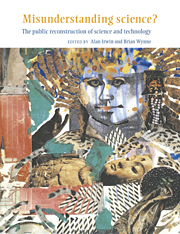Book contents
- Frontmatter
- Contents
- Acknowledgements
- Introduction
- 1 Misunderstood misunderstandings: social identities and public uptake of science
- 2 Science and Hell's kitchen: the local understanding of hazard issues
- 3 Disembodied knowledge? Making sense of medical science
- 4 Now you see it, now you don't: mediating science and managing uncertainty in reproductive medicine
- 5 Ignoring science: discourses of ignorance in the public understanding of science
- 6 Insiders and outsiders: identifying experts on home ground
- 7 Authorising science: public understanding of science in museums
- 8 Nature's advocates: putting science to work in environmental organisations
- 9 Proteins, plants, and currents: rediscovering science in Britain
- Conclusions
- Notes on contributors
- Select bibliography
- Index
6 - Insiders and outsiders: identifying experts on home ground
Published online by Cambridge University Press: 16 October 2009
- Frontmatter
- Contents
- Acknowledgements
- Introduction
- 1 Misunderstood misunderstandings: social identities and public uptake of science
- 2 Science and Hell's kitchen: the local understanding of hazard issues
- 3 Disembodied knowledge? Making sense of medical science
- 4 Now you see it, now you don't: mediating science and managing uncertainty in reproductive medicine
- 5 Ignoring science: discourses of ignorance in the public understanding of science
- 6 Insiders and outsiders: identifying experts on home ground
- 7 Authorising science: public understanding of science in museums
- 8 Nature's advocates: putting science to work in environmental organisations
- 9 Proteins, plants, and currents: rediscovering science in Britain
- Conclusions
- Notes on contributors
- Select bibliography
- Index
Summary
Expertise in context
The public understanding of science is situated in a changing theoretical landscape. Debates about modernity, post modernity, and globalism are throwing into question significant conceptual categories that social science has previously taken for granted. In this flux, the relationship between science, technology, and publics has become a central concern of social theory. Western society is depicted as increasingly dependent on specialised roles and institutions that are associated with specialised knowledges and competences. Accordingly, theoretical frameworks are being developed that allocate key roles to concepts relating to perceptions of risk, dependence on expert systems, and trust. Within these debates the ‘local’ has assumed a new significance in constituting identity-based responses. However, empirical studies of the relationship between the local and wider society are sparse. This chapter is based on ethnographic research, focusing on local interpretations of expertise relating to ionising radiation in the Isle of Man. It examines the social and cultural interpretations of science that emerge from the mundane transactions of people in ‘micro-social’ situations. This approach is in tune with what Knorr-Cetina calls methodological situationalism, which ‘demands that descriptively adequate accounts of large-scale social phenomena be grounded in statements about actual social behaviour in concrete situations’ (1988: 22).
In the following pages I describe how authoritative knowledges associated with science are assumed, attributed, and evaluated in practice, within both lay contexts and institutional settings on the Isle of Man. It is proposed that there are many similarities in the ways expertise is constituted in ‘informal’ and ‘formal’ settings, and that drawing boundaries between the two is far from straightforward.
- Type
- Chapter
- Information
- Misunderstanding Science?The Public Reconstruction of Science and Technology, pp. 126 - 151Publisher: Cambridge University PressPrint publication year: 1996
- 16
- Cited by



